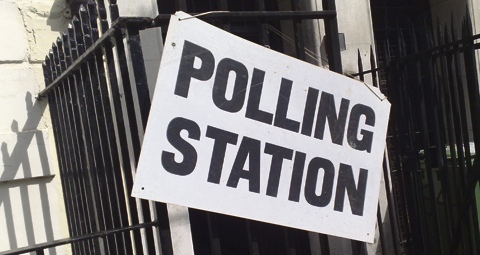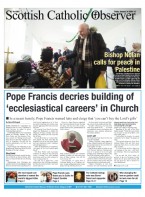BY Ian Dunn | January 31 2014 | ![]() 0 COMMENTS
0 COMMENTS ![]() print
print

‘Catholic vote’ exists in Scotland
Publication Date: 2014-01-31
Independent report: Scottish Catholics more likely to vote Labour than any religious group
A new report has found strong evidence that Catholics in Scotland vote with remarkable consistency, proving the existence of a ‘Catholic vote’ here.
The London-based think-tank Theos published the report Voting and Values in Britain: Does Religion Count? this week and it revealed Scottish Catholics were more likely to vote Labour than any other religious group in the country, as seen in voting patterns in the 2010 UK General Election.
The report, which analysed data from the past 50 years from the British Election Survey and the British Social Attitudes survey, discovered that even this high level of support represented a tailing from the height of support from Scottish Catholics for the Labour party. In the 1997 UK General Election nearly 80 per cent of Scottish Catholics voted Labour, a figure that dropped to 65 per cent by the 2010 election. Even this later figure was still double the level of support for the Labour Party among English Catholics.
“There is a clear geographical division in the levels of support for Labour amongst Catholics residing in Scotland and England,” the report says. “The difference on each occasion shows much higher levels of Catholic support for Labour in Scotland, ranging from a low of 19.8 per cent in the 2001 election to a high of 28.7 per cent in the 2010 election.”
The report also finds that there is a much higher chance of Scottish Catholics voting for Labour than there is of any other person of any religious persuasion voting for any other party. Even with the existence of four party politics in Scotland, the report says ‘all groups are less likely to have voted Labour compared to Catholics in 2010, while the latter are less likely to have voted either Conservative (compared to Church of Scotland/Presbyterian) or Liberal Democrat (compared to those with no religion).’
John Deighan, the parliamentary officer for the Scottish Bishops, said the findings were fascinating, and proved that a ‘Catholic vote’ did exist in Scotland.
“I think there are certainly several intersecting reasons why there seems to be a particularly strong allegiance to the Labour Party among Scottish Catholics but a really big part of it is the idea that that party is the one which is most in solidarity with the poor,” he said. “And, of course, many people are very reluctant to change their party once they first vote for them.”
Mr Deighan also noted that, while the figures showed a very strong level of support among Scottish Catholics for the Labour Party, it has dropped significantly over the past 15 years.
“One of the things I find interesting is the cultural shift of support at 80 per cent for Labour in 1997, to 65 per cent now,” he said. “You could say that one thing that has shifted for Labour in that time is the perception they are less concerned with solidarity for the poor, and you also have the rise of the SNP as well.”
Politicians of all parties in Scotland are likely to study the findings of the report closely ahead of the independence referendum later this year.
Nick Spencer, Theos’s research director and co-author of the report, believes the report has serious lessons for politicians.
“It does show, however, that there are clear and significant alignments between various religious and political camps, of which politicians should be aware,” he said. “At a time when mass party membership, political ideology and party tribalism are at a low ebb, we should pay attention to the big political values that shape our voting behaviour.”
—This story ran in full in the January 31 edition print of the SCO, available in parishes.










